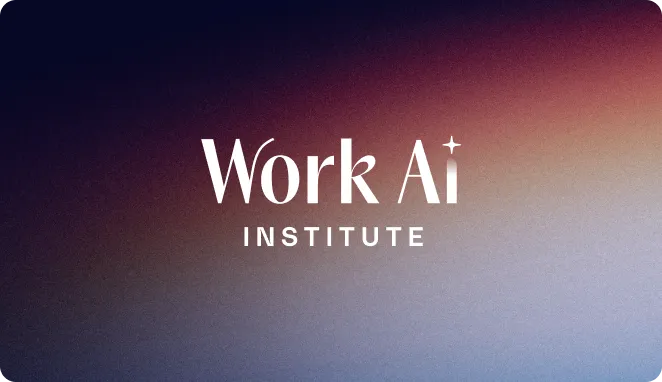- AI is transforming healthcare operations by streamlining behind-the-scenes workflows—such as denials management, prior authorizations, onboarding, and compliance—enabling providers to resolve issues faster, reduce errors, and improve both financial results and staff satisfaction.
- Glean’s Work AI platform integrates seamlessly with the tools healthcare teams already use, delivering secure, context-aware automation and instant knowledge retrieval without the need for new workflows or complex training.
- By adopting AI solutions like Glean, healthcare organizations can reduce operational friction, save significant staff time, and create a scalable foundation for efficiency and high-quality patient care.
Healthcare providers don’t need more talk about the potential of AI. What they need are practical ways to relieve the pressure of shrinking margins, staffing shortages, and operational inefficiencies — right now. That’s where AI is starting to prove its value, not in theory, but in the workflows teams use every day.
As Deloitte notes, “Generative AI holds promise across industries to streamline operations… enhancing efficiency, compliance, and consumer-centricity.” In healthcare, that means fewer delays, faster decisions, and more time spent on high-impact work.
While much of the focus around AI in healthcare has centered on diagnostics or patient-facing tools, the real opportunity lies in streamlining the complex processes that happen behind the scenes — from revenue cycle management and prior authorizations to onboarding and credentialing. By embedding AI directly into workflows, staff can spend less time searching, switching systems, or chasing documentation and more time delivering quality care.
This blog explores how AI is transforming provider operations and how Glean’s Work AI platform can make that transformation practical, secure, and scalable.
What is AI in healthcare operations?
AI in healthcare operations refers to the use of technologies like machine learning, natural language processing, and retrieval-augmented generation (RAG) to automate tasks, surface knowledge instantly, and support faster, more confident decision-making.
Unlike standalone tools that require staff to adopt new workflows or undergo complex training, the most effective AI solutions embed directly into the systems providers already use — such as SharePoint, Microsoft Teams, ServiceNow, or EHR platforms. This makes it easy for clinical and administrative teams to get the information they need without switching tabs or digging through disconnected documentation.
AI supports more than just speed. It helps staff work more effectively by reducing friction in everyday tasks. Whether it’s helping a denial specialist find the right appeal template or enabling a credentialing coordinator to check a provider’s onboarding status, AI can reduce errors, shorten resolution times, and improve both financial outcomes and staff experience.
How AI improves operational efficiency in healthcare
Healthcare providers face a perfect storm of operational pressure: declining reimbursement, growing denial rates, chronic staffing shortages, and increasingly complex compliance demands. These challenges aren’t new, but AI gives organizations a new way to address them at scale.
Below are five key ways AI can improve healthcare operations today, with examples of how Glean supports each use case.
1. Reducing denials and improving appeal rates
Denials continue to rise, with many providers seeing 10–15% of claims rejected on first submission, according to a report by Experian Health. While many of these issues are preventable, staff often don’t have the time or resources to investigate root causes or draft high-quality appeals.
The healthcare industry spends billions annually contesting denials — often for missing documentation or mismatched codes. AI can help teams avoid these issues by surfacing payer-specific SOPs, sample appeal language, and required attachments on demand.
Glean enables denial teams to ask targeted questions like, “What’s the appeal policy for CO-197 from Anthem?” and receive precise guidance pulled from internal systems like SharePoint or Google Drive. With that context, teams can submit more appeals per day, improve approval rates, and reduce the backlog of unresolved claims.
2. Accelerating prior authorizations
Prior authorization workflows are a top source of care delays. According to the American Medical Association’s 2024 AMA prior authorization physician survey, the average physician handles more than 39 prior authorizations per week — and 93% report that the process leads to delayed treatment. Every missed detail or unclear submission adds days to a patient’s care plan.
AI gives administrative teams the ability to quickly pull payer-specific requirements, reference similar cases, and verify what documentation is needed to submit clean requests the first time.
With Glean, teams can find prior auth rules, review submission checklists, and access documentation templates without toggling between portals. This leads to faster turnaround times, fewer rejections, and higher satisfaction for both providers and patients.
3. Speeding up provider onboarding and credentialing
Onboarding delays don’t just frustrate new hires — they directly affect patient access, care capacity, and revenue. But credentialing workflows are still managed through scattered spreadsheets, shared folders, and manual trackers.
AI can streamline this process by indexing provider records, surfacing onboarding templates, and helping teams track credentialing status in real time.
Glean makes it easy to retrieve compliance documents, checklists, and training materials from one place. For credentialing coordinators, this reduces onboarding time by up to 85% and improves retention. One home health provider improved nurse retention by 15% after using Glean for just 90 days — a clear sign that smoother onboarding translates to stronger engagement.
4. Enhancing claims status tracking
Manually checking the status of claims across different payer portals is time-consuming and error-prone. Staff often need to log into multiple systems, reference spreadsheets or emails, and rely on tribal knowledge to figure out what’s been paid, what’s pending, and what needs to be followed up. These inefficiencies can delay revenue recovery and limit a team’s capacity to manage the volume of claims that come in every day.
With Glean, staff can search for a specific claim — for example, “What’s the status of claim #874523?” — and receive a clear, AI-generated summary based on information already stored within the organization. That might include remittance files in Google Drive, notes in SharePoint, or internal documentation in email or ticketing systems. Glean assembles this context automatically, helping teams prioritize the right follow-ups and reduce unnecessary delays.
The time savings add up. On average, Glean saves up to 110 hours per user per year — time that can be redirected to more strategic work or direct patient support.
5. Supporting compliance and audit readiness
Maintaining compliance is an ongoing responsibility. From HIPAA and SOC 2 to payer-specific requirements and internal documentation standards, providers are expected to deliver fast, accurate proof of adherence — often on short notice.
AI can reduce the burden of audit prep by making it easier to find the right version of a policy, validate whether it’s current, and ensure that only authorized users have access.
With Glean, teams can search across all their systems while enforcing existing permission structures. Every answer includes source citations, so staff know exactly where the information came from and when it was last updated. This makes compliance workflows more efficient and more reliable — and helps teams stay prepared, even under pressure.
Why Glean for healthcare providers
Glean is a Work AI platform built to help healthcare organizations surface knowledge, automate busywork, and improve team productivity — all while meeting the strict demands of compliance and data security.
Unlike tools that require new workflows or standalone systems, Glean integrates with the platforms teams already use. It connects the dots across siloed systems like SharePoint, Teams, and email, enabling staff to ask a question and instantly find policy documents, templates, credentialing packets, or claim information — all in context, all within permission boundaries.
For healthcare providers, that means:
- Fewer preventable denials through fast access to payer policies, appeal templates, and historical documentation
- Faster onboarding by making credentialing packets, SOPs, and training materials instantly accessible
- Smoother operations with fewer delays and less time spent searching, toggling between tools, or asking around for information
- Higher staff satisfaction and productivity thanks to AI assistance that works behind the scenes
- Complete control over data with HIPAA compliance, on-prem deployment options, and role-based access
Glean doesn’t replace your existing systems — it makes them work smarter. And with proven success across healthcare organizations, it offers a scalable, secure path to real results.
Getting started: responsible, scalable AI adoption
Operational pressure is rising, but not every fix requires an overhaul. Many of the most frustrating delays in healthcare stem from repeatable tasks and disconnected systems — not from a lack of effort or expertise. That’s where AI can help.
Start by identifying high-friction workflows that are slowing down care delivery or revenue recovery. Look for patterns — tasks that are repetitive, time-sensitive, and dependent on hard-to-find documentation are often the best candidates for AI support. This could include denial appeals, provider onboarding, audit prep, or claims tracking.
Next, choose partners who understand the complexity of healthcare operations. Look for solutions that are compliant with HIPAA, integrate with your existing tools, and provide deployment flexibility — whether you need cloud, hybrid, or on-prem. Integration matters: AI is most effective when it can draw from the systems your staff already rely on, such as ticketing systems, and knowledge repositories.
Finally, ensure your teams are equipped for success. Adoption doesn’t happen by accident — it’s the result of intuitive design, thoughtful onboarding, and ongoing support. Glean’s simple interface and strong adoption metrics make it easier to scale AI across departments, while still preserving the human oversight that’s essential in healthcare.
AI’s biggest opportunity in healthcare is hiding in plain sight
AI doesn’t have to start with diagnostics or disruptive tech bets. For most healthcare providers, the biggest wins are waiting in the workflows that already exist — the ones where delays, errors, and manual work chip away at efficiency and morale.
Processes like denials, prior authorizations, and onboarding aren’t just administrative tasks. They’re points of friction that, when streamlined, can improve both the patient and employee experience. With the right AI platform, these everyday bottlenecks become opportunities to free up time, improve cash flow, and reduce burnout.
Glean brings that transformation within reach. It integrates with the tools your teams already use, enforces enterprise-grade security, and delivers fast, accurate answers grounded in your organization’s knowledge — so employees can move with clarity and confidence.
Ready to see what Glean can do for your organization? Get a demo to see the platform in action or download the healthcare whitepaper for a deeper dive into Glean’s impact on providers.









